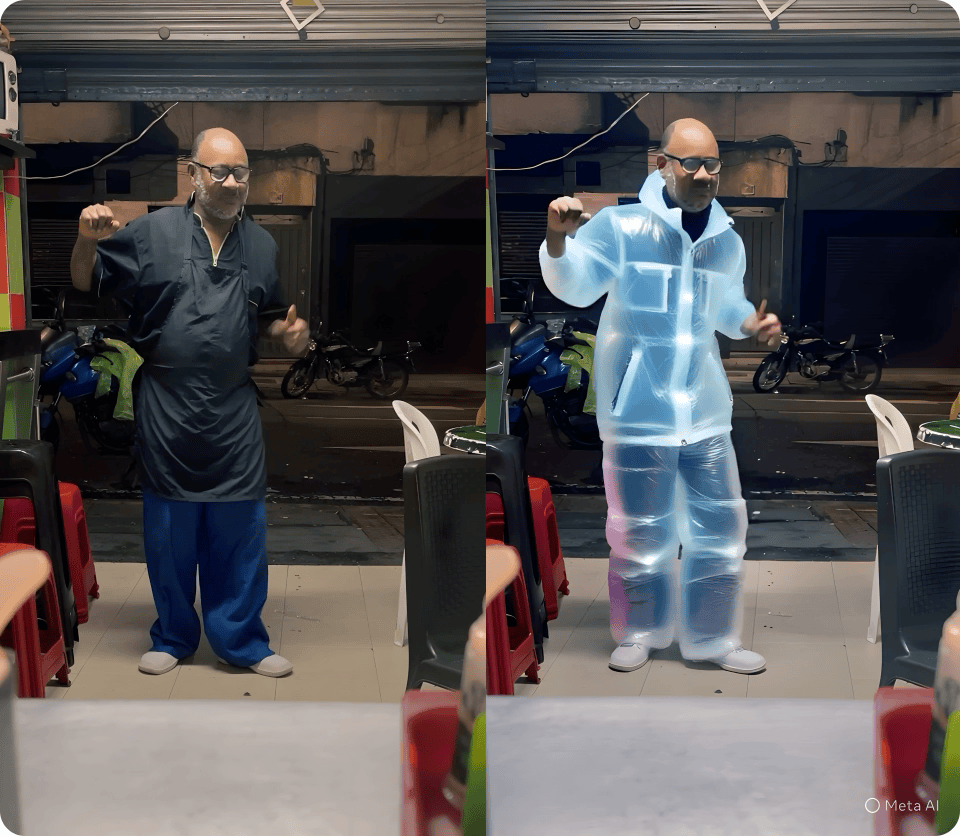Meta has launched its first generative AI video editing tool, a significant and playful step in its strategy to bring advanced artificial intelligence to its billions of users. The new feature is now available in the United States and more than a dozen other countries, accessible through the company’s standalone Meta AI app, the Meta.AI website, and the dedicated ‘Edits’ video app.
In its announcement, Meta detailed how the tool allows users to transform the first 10 seconds of a video using over 50 preset prompts, free for a limited time. The feature can restyle a clip as an anime scene, change a user’s outfit, or transport them to a desert. However, a hands-on review from The Verge revealed the technology’s nascent stage, producing quirky and inconsistent results like purple cacti and fluorescent pink eyes.
This gap between promise and reality underscores the tool’s current status as more of a creative toy than a professional instrument. While Meta plans to introduce custom text prompts for greater control later this year, the launch serves as a massive public beta test, showcasing both the fun and the flaws of consumer-grade generative video.
The Price of Personalization: Your Data
The new video tool does not exist in a vacuum; it is deeply integrated into the Meta AI app, an ecosystem built on a foundation of data personalization that has drawn sharp criticism. As we reported in May, the app’s “Memory” feature is on by default, learning from user conversations to tailor responses.
While Meta provides details in its Help Center to manage this data, its terms of service bluntly warn users to “not share information that you don’t want the AIs to use and retain.” An expert from the Consumer Federation of America commented called the disclosures and privacy settings are “laughably bad.”
Meta’s strategy is currently facing significant legal and ethical challenges, particularly in Europe. The company recently began using public posts from EU users to train its AI, justifying the move under the GDPR’s “legitimate interests” clause. In response, the privacy rights group NOYB filed a complaint, arguing the solution is simple: Meta “would just have to ask users for an opt-in consent” to use their data for AI training, rather than relying on a complex opt-out system.
This sentiment is echoed by cybersecurity experts. In a statement to ActuIA, Adrianus Warmenhoven, an expert at NordVPN, said that Meta’s approach facilitates a kind of forced adoption. “What seems transparent and useful on the surface hides an uncomfortable truth. Meta prioritizes convenience over transparency, facilitating data sharing without revealing its real cost.”
The concern is that this data could fuel more than just personalization. Justin Brookman of Consumer Reports noted that the system feels inherently adversarial, stating, “The idea of an agent is that it’s working on my behalf — not on trying to manipulate me on others’ behalf.”
Building a Walled Garden in an Open Field
Meta’s 2025 AI rollout has been aggressive and multi-pronged, revealing a complex competitive strategy. The journey began in April with the launch of the ‘Edits’ video editing app, a direct, watermark-free challenger to ByteDance’s dominant CapCut. Shortly after, the company released the standalone Meta AI application, establishing a central hub for its Llama 4-powered assistant, a social ‘Discover’ feed for sharing AI creations, and controls for its Ray-Ban smart glasses.
On one hand, CEO Mark Zuckerberg has positioned the company’s open-source AI strategy as a way to prevent rivals like Apple from becoming “gatekeepers” of the technology. In an interview, he explained that with Llama, they are “not trying to build a huge business around this.”
However, last year Meta and Apple have reportedly held discussions about integrating Meta’s generative AI models into Apple’s own AI system. This move suggests a complex dynamic of co-opetition, where Meta is simultaneously challenging and courting its biggest rivals.
This ambitious ecosystem will likely come at a cost to users. While the tools are currently free, that may not last. Instagram head Adam Mosseri has previously indicated that paid features could eventually be introduced to offset the high expense of running AI features. This aligns with the iterative approach Adam Mosseri outlined for the product’s rollout.
From Simple Cuts to Generative Worlds
This new feature signals an industry shift from traditional video editing to fully generative creation. The global AI video generator market is already a significant force, and according to Fortune Business Insights, it is projected to grow from over $550 million in 2023 to more than $2.5 billion by 2032.
With reports suggesting nearly half of all businesses are now using AI for short-form video content, Meta is racing to capture a share of this burgeoning market.
The company is leveraging years of internal research, from its Make-A-Scene models to the more recent Movie Gen project, to power these new consumer tools. However, the foundation of this technology remains contentious. Meta also continues to face legal challenges over allegations that its models were trained using copyrighted books obtained without permission, a persistent shadow over its AI ambitions.
Other recently filed lawsuits against Midjourney and Stability AI target alledged copyright breaches specifically in the field of AI image generation. And Google’s alledged use of YouTube videos for its Veo AI video generator could lead to other high-stakes court cases in the forseeable future.
Ultimately, Meta is executing a clear and aggressive strategy: build an all-encompassing AI ecosystem that is deeply integrated, socially driven, and powered by its vast reserves of user data. This approach yields powerful and entertaining tools but places the company in direct conflict with privacy advocates and regulators, forcing a difficult trade-off for users. The quirky AI video editor, therefore, is so far more a global experiment testing the public’s appetite for AI-driven creation and their tolerance for the data collection required to make it possible.
